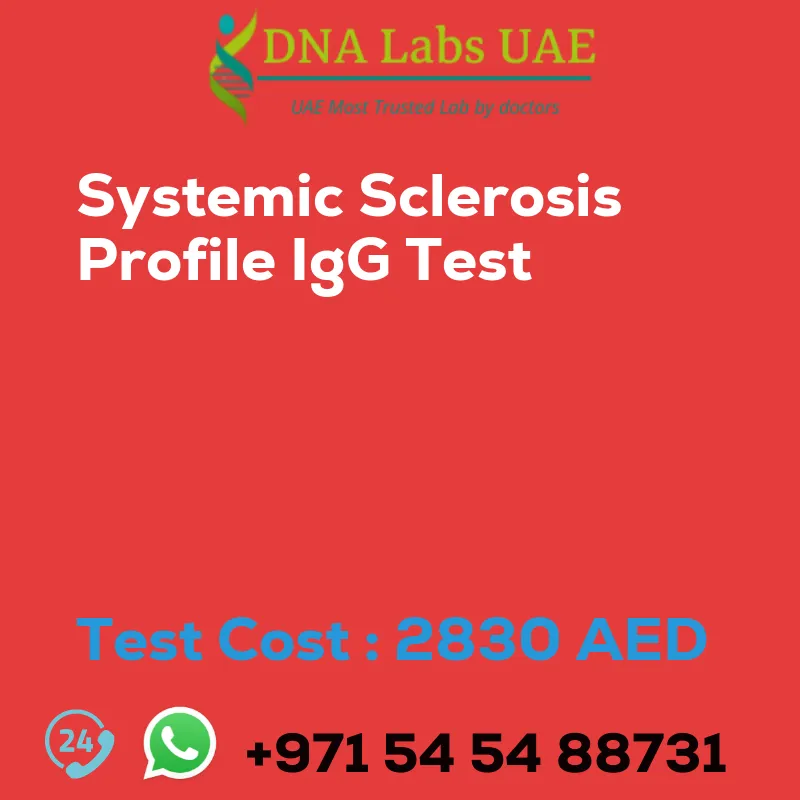SYSTEMIC SCLEROSIS PROFILE IgG Test
At DNA Labs UAE, we offer the SYSTEMIC SCLEROSIS PROFILE IgG test to diagnose and monitor systemic sclerosis, also known as scleroderma. This chronic autoimmune disease is characterized by the thickening and hardening of the skin and connective tissues.
Test Components
- Scl-70
- CENP A
- CENP B
- RP11
- RP155
- Fibrillarin
- NOR90
- Th/To
- PM-Scl 100
- PM-Scl 75
- Ku
- PDGFR
- Ro-52
Test Price
The cost of the SYSTEMIC SCLEROSIS PROFILE IgG test is AED 2830.0.
Sample Condition
For the test, a minimum of 2 mL serum from 1 SST is required. The sample should be shipped refrigerated or frozen.
Report Delivery
Samples are accepted from Monday through Saturday by 11 am, and the report will be delivered on the same day by 6 pm.
Test Method
The SYSTEMIC SCLEROSIS PROFILE IgG test is performed using the immunoblot method.
Test Type
This test is specifically designed for the diagnosis of autoimmune disorders.
Referring Doctor
A rheumatologist is the appropriate doctor to consult for this test.
Test Department
The SYSTEMIC SCLEROSIS PROFILE IgG test is conducted in the IMMUNOPATHOLOGY department at DNA Labs UAE.
Pre Test Information
No special preparation is required before taking this test.
Test Details
The systemic sclerosis profile IgG test measures the levels of immunoglobulin G (IgG) antibodies in the blood. These antibodies are produced by the immune system in response to foreign substances. In the case of systemic sclerosis, IgG antibodies target specific proteins found in the body’s connective tissues, leading to inflammation and tissue damage.
The test includes several different antibodies associated with systemic sclerosis, such as anti-centromere antibodies (ACA), anti-topoisomerase I antibodies (also known as anti-Scl-70 antibodies), and anti-RNA polymerase III antibodies. These antibodies are linked to different subsets and manifestations of systemic sclerosis.
The results of the test help healthcare providers in diagnosing systemic sclerosis and determining the specific subtype of the disease. They also aid in monitoring disease activity and assessing the effectiveness of treatment.
It is important to note that the systemic sclerosis profile IgG test is just one tool in the diagnostic process. It should be used in conjunction with other clinical evaluations and tests. A comprehensive diagnosis is made by considering the patient’s symptoms, medical history, physical examination findings, and other laboratory tests.
| Test Name | SYSTEMIC SCLEROSIS PROFILE IgG Test |
|---|---|
| Components | *Scl-70 *CENP A *CENP B *RP11 *RP155 *Fibrillarin *NOR90 *Th/To *PM-Scl 100 *PM-Scl 75 *Ku *PDGFR *Ro-52 |
| Price | 2830.0 AED |
| Sample Condition | 2 mL (1 mL min.) serum from 1 SST.\nShip refrigerated or frozen. |
| Report Delivery | SampleMon through Sat by 11 am; Report Same day by 6 pm |
| Method | Immunoblot |
| Test type | Autoimmune Disorders |
| Doctor | Rheumatologist |
| Test Department: | IMMUNOPATHOLOGY |
| Pre Test Information | No special preparation required |
| Test Details |
The systemic sclerosis profile IgG test is a blood test used to diagnose and monitor systemic sclerosis, also known as scleroderma. Systemic sclerosis is a chronic autoimmune disease characterized by the thickening and hardening of the skin and connective tissues. The IgG test specifically measures the levels of immunoglobulin G (IgG) antibodies in the blood. IgG antibodies are produced by the immune system in response to foreign substances, such as bacteria or viruses. In the case of systemic sclerosis, IgG antibodies target specific proteins found in the body’s connective tissues, leading to inflammation and tissue damage. The systemic sclerosis profile IgG test typically includes several different antibodies, such as anti-centromere antibodies (ACA), anti-topoisomerase I antibodies (also known as anti-Scl-70 antibodies), and anti-RNA polymerase III antibodies. These antibodies are associated with different subsets and manifestations of systemic sclerosis. The results of the test can help healthcare providers in diagnosing systemic sclerosis and determining the specific subtype of the disease. They can also be used to monitor disease activity and assess the effectiveness of treatment. It is important to note that the systemic sclerosis profile IgG test is just one tool in the diagnostic process and should be used in conjunction with other clinical evaluations and tests. A healthcare provider will consider the patient’s symptoms, medical history, physical examination findings, and other laboratory tests to make a comprehensive diagnosis. |







